This post was supposed to be finished last week, but I didn’t expect it to take me this long (sorry again!). I really wanted to take a moment to thank the 50 people who followed me! I don’t even have 50 contacts on my phone ??
I remember when I was about six years old, back when you could still buy cheese at a reasonable price (curse you inflation), watching a French cartoon that portrayed the dreamy life of Princess Sisi. Although I don’t recall much of the story, I vividly remember being mesmerized by her beauty, dressed in pink silk gowns with her heart-shaped face and especially the fact that she could talk to animals! (That detail sealed the deal for me.) In the cartoon, she was deeply in love with Prince Franz, her husband, and together they lived a happy, carefree life, riding horses through the vast Austrian meadows. As I grew older, I realized I’d been deceived (yet again) by the media, and that the real life of Elisabeth of Austria, with all her breathtaking beauty, was actually tragic. History remembers her for her beauty, but behind it was a troubled soul.
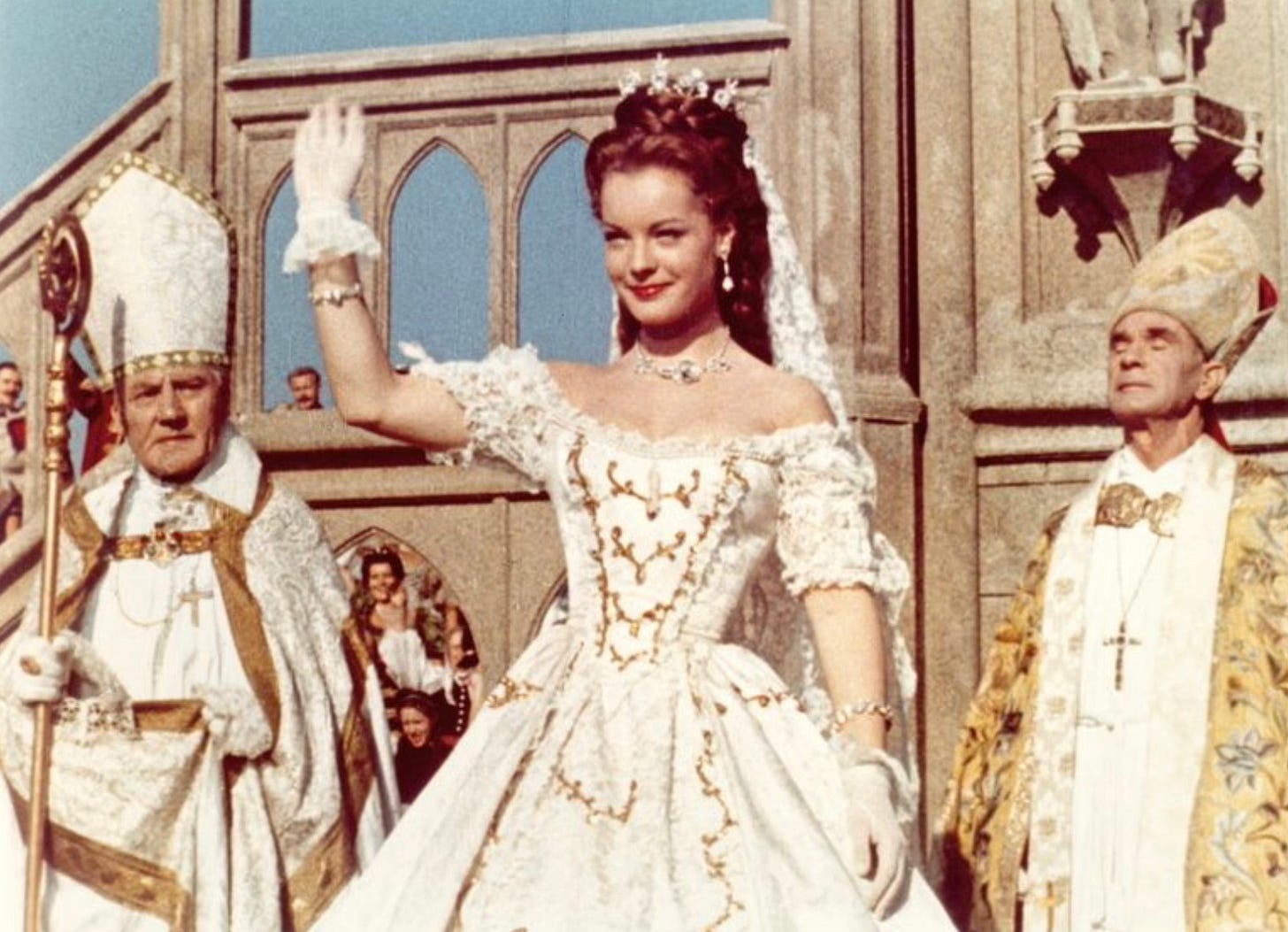
Elisabeth, born on December 24, 1837, was the daughter of Princess Ludovika and Duke Maximilian Joseph of Bavaria. "Sisi" was the affectionate nickname given to her by her family. She was one of ten siblings, all of whom were nieces and nephews of Duke Franz Karl, who would eventually become the Emperor of Austria. Given their high status, one might expect the children to have followed a rigorous and strict education, right? Well, this was not really the case. Their father, although noble, was a liberal who led a free-spirited, bohemian life and enjoyed the company of … commoners (scandalous right ?), often neglecting his responsibilities as a father and husband. Although Princess Ludovika disapproved of her husband's attitude toward their children’s education, coming herself from a strict background, she eventually conceded, starting to appreciate the quiet and calm life of their estate. Elisabeth inherited much from her father: his free and indomitable spirit, as well as his stubbornness, despising the formalities of court life.
While Elisabeth spent her days riding horses and enjoying the pleasures of a carefree childhood, her older sister, Helene, did not have that luxury. She was raised with a focus on receiving an excellent education and was more refined, serious, and disciplined than her sister. In short, she possessed all the qualities and potential to become the wife of a king, or perhaps even the emperor himself ?
Guess what? She was indeed engaged to Franz-Joseph, who became Emperor of Austria after his father, Franz Karl, in 1848. This engagement was orchestrated by Franz-Joseph’s mother, Archduchess Sophie, formerly known as Princess Sophie of Bavaria, who was Helene and Sisi’s maternal aunt. So basically, if 1 + 1 = 2 and 5 + 5 = 10, you would understand that Helene and Sisi were her nieces, making Franz-Joseph their first cousin.. (no comment)
Sophie, Archduchess of Austria
Ever since marrying, Archduchess Sophie was regarded as more intelligent and sharp than her feeble husband in the Viennese court. She was often referred to as “the only man at this court swarming with weaklings.”1 When her husband ascended to the throne in 1848, Sophie urged him to abdicate, eager for her son, who was just 18 at the time, to assume the role instead. She recognized her husband's inability to effectively rule, especially as Austria faced troubling times. In contrary, Franz-Joseph was diligent in his studies, a dedicated learner, and overall possessed all the qualities necessary to be a competent emperor.
Moreover, having a say in the country’s affairs is certainly easier when your son is the one running the place, isn’t it? The young emperor was very devoted to his mother and always took her opinion seriously. While he didn’t follow her advice blindly, he consistently valued her thoughts.
In 1853, Helene and her mother traveled from Bavaria to Bad Ischl, where the mothers of the future couple organized a meeting in the calm of the resort, intending for the fiancés to formally introduce themselves to one another. Elisabeth also tagged along on the trip. However, as soon as they arrived, everything changed. Franz-Joseph experienced love at first sight upon seeing his beautiful, doe-eyed cousin Elisabeth…not Helene, the sister who had been preparing her whole life for this marriage. He insisted that he wanted to marry the fifteen-year-old instead, which was not only rude to Helene but also quite presumptuous. He didn’t even bother to ask young Sisi if she wanted this arrangement (because, of course, how could she possibly say no right??). Elisabeth, being only a naïve child, was left feeling utterly confused by the situation and could not refuse.
Sophie highly disapproved, believing that Elisabeth lacked the character and qualities to be a suitable empress (which was true, in a way). However, Franz-Joseph was so insistent that she eventually caved in. She was not pleased with her son; she had raised him to be obedient and reasonable, and for the first time in his life, he was opposing her. Little did Franz-Joseph know that his decision would be a grave mistake, not only for himself but for his country and especially for Elisabeth.
Their marriage took place within the same year, on April 24, 1854. At 16 years old, Elisabeth became the empress one of the most influential empire of the time.
Life at Court
From the very start, Elisabeth was looked down upon by the other nobles. For years, everyone speculated about who would become empress, tossing around names of various princesses and high-ranking nobles as potential brides. No one ever considered Elisabeth of Bavaria to be a worthy candidate. Even though she was noble, she wasn’t “noble” enough in their eyes. Her father was infamous, and people often made a mockery of him at court, ridiculing his less common preferences and interest in commoners, which led them to see him as a fool.
Elisabeth’s lack of a proper education was also heavily criticized. People mocked her for not being able to speak multiple languages or for being incapable of engaging in conversations regarding literature or philosophy. Sophie made sure to let her know that she needed to fix this shortcoming, and fast. Elisabeth soon found herself surrounded by many tutors. Despite everything, in the end, Sisi’s studies still fell short of her mother-in-law's expectations, and Sophie didn’t hesitate to shame her on a daily basis for that.
Elisabeth felt lost in Vienna, often seen crying or having nervous breakdowns. She began writing very sad and melancholic poems during the first months of her marriage. To cope, she also started to rebel in small but numerous ways, throwing a lot of tantrums:
She exaggerated her curtsy mockingly , followed court etiquette only when she wanted to, and exiger beer at the table, having breakfast in bed, disappearing when needed, and reappearing when her presence was neither required nor wanted. Despite the risk of embarrassing her husband, she publicly criticized the monarchy and ministers. Sophie was so done with her and regretted Helene every single day. Yet, Franz-Joseph found her antics amusing, his love for her never flattering (my guy was the definition of patience, you’ll see)2
Madame, we have chosen you to bear us sons, not to give us advice.
-Sophie to Elisabeth (how rude)
When Elisabeth gave birth to her first child just a year after their marriage, many were disappointed. Yes, you guessed it right, it’s because it was a girl! Her mother-in-law wasted no time taking control of the baby's upbringing, declaring that Elisabeth was unworthy of raising her own children. To add insult to injury, Sophie named the baby after herself, leaving the Empress with no room to argue. She even moved baby Sophie into her own apartments, making it incredibly difficult for Elisabeth to see her daughter without facing more insults from her mother-in-law. The same thing happened with her second child, another girl named Gisela.
Even though Franz-Joseph cared deeply for his wife he struggled to balance his love for her with his loyalty to his mother. Because of this, he failed to stand up for her and let her endure Sophie’s constant torment for many, many years.
Tragically, Elisabeth’s eldest child, Sophie, died of scarlet fever on May 29, 1857, after a trip to Hungary that her mother-in-law had strongly opposed. This loss plunged her into a deep depression, causing her to start believing what everyone said about her—maybe they were right, maybe she truly was a terrible mother. She couldn't even dare to think about taking a break; she still needed to have a male heir. Not a day passed without her mother-in-law or the court reminding her of her failure to produce one (let’s be honest here… if anyone was to blame, it was Franz-Joseph). Finally, in 1858, a son named Rudolf was born, giving Sisi a bit of relief, though not really. Oh, and guess what? Sophie also took him away from her!
It’s not clear exactly when, but shortly after the birth of her son, Sisi became increasingly self-conscious about her appearance. She began exercising daily and starved herself on a daily basis. Many suggest that this was her way of trying to exert control over at least one aspect of her life.
Elisabeth's health declined due to her extreme diet, constant stress from social pressures in Vienna, and feelings of regret about her marriage. She developed a cough, likely tuberculosis, which led her doctors to suggest she leave the capital to recover. After spending the winter in Madeira, near Morocco, she felt revitalized. However, just four days after returning to Vienna, she relapsed with a cough and high fevers. To regain her strength, she then went to travel for about two years, rarely going back to the capital.
It was during her travels that she was painted by Franz Xaver Winterhalter, making this famous portrait.
Hungary's Cherished Empress
Hungary and Austria have had a complex relationship for centuries, ever since Hungary became part of the Habsburg Empire. Over the years, Austria struggled to govern its diverse territories, and with the rise of revolutionary movements in Europe, many of Austria’s vassal states, including Hungary, revolted. Hungary’s first major revolution occurred in 1848, the same year Franz-Joseph became Emperor. Although the revolution was ultimately crushed in 1849 with the help of Russia, the Hungarian spirit of nationalism and pride in their identity grew stronger. Austria responded harshly to the rebellion by suspending Hungary’s constitution, imposing German as the official language, intensifying tensions between Vienna and Hungary.
Ever since her first trip to Hungary, Elisabeth fell in love with the Hungarian way of life. She became close friends with Count Andrássy, a prominent Hungarian statesman. Elisabeth dedicated herself to protecting Hungarian interests, acting as a mediator between her husband, Emperor Franz Joseph, and Hungary, persistently urging him to negotiate with the Hungarian leaders for a treaty instead of repression.
For the last time I beg you in Rudolf's name not to lose this, at the last moment...
...If you say “No”, if at the last moment you are no longer willing to listen to disinterested counsels. Then... you will be relieved forever from my future... and nothing will remain to me but the consciousness that whatever may happen, I shall be able to say honestly to Rudolf one day: "I did everything in my power.Your misfortunes are not on my conscience."3
-Elisabeth to Franz-Jospeh in one of her letters
Franz Joseph, who was initially resistant to the idea of autonomy for Hungary, eventually caved in after many efforts by his wife. The negotiations led to the Compromise of 1867, where Hungary became an independent entity within the Austro-Hungarian Empire, but Franz-Joseph would still be their Emperor and Elizabeth their dear Empress.
While Sisi’s support for Hungary is admirable, it was also biased and not merely a noble duty to her empire. This favoritism didn’t sit well with everyone, particularly the Bohemians, who felt betrayed, especially since Bohemia had always remained loyal to Austria, while Hungary had marched on Vienna just a few years earlier. This created a generalized frustration in the empire. It was concerning, especially as the empire's influence continued to wane despite Franz-Joseph’s efforts.
Empress of Disappointment ?
Her incapacity into doing her imperial duties
She would often cancel last-minute on events meant and organized for her, which hurt her ability to connect with the people she ruled. Many were confused about her abilities as an empress. She never attended imperial events , her husband often appeared publicly alone, which was not viewed favorably by the public. Franz Joseph, who rarely asked her for anything, begged her many times to try harder to attend events that would help improve the Empire’s image during these difficult times."
Control freak
She forbade her ladies-in-waiting from marrying, viewing it as a personal insult. As a result, some of them felt their chance to live their own lives was stolen for Sisi’s need to be surrounded by others. They felt trapped in their relationship with the empress and ultimately died unmarried, some filled with regrets.
Unwillingness to be a mother
Elisabeth never formed a close bond with her children and she spent very little time with Gisela and Rudolph, the latter suffering throughout his life from the profound lack of maternal love.
Her desire to anger the court
Moreover, over time, she became increasingly bitter and sarcastic, publicly mocking other nobles. She would do anything to irritate them, inviting entertainers to the court. While her husband worked, she welcomed all sorts of guests to the palace: gymnastics teachers, Greek instructors, yoga and fencing coaches, hairdressers, masseuses, vagabonds, Gypsies, abandoned children, and a menagerie of animals, including dogs, cats, horses, and parrots4
The cult of Beauty
Ever since becoming empress, Elisabeth never lacked food, money, or luxury, but she had tragically little control over anything in her life. She couldn’t even raise her own children. I know she is often criticized for not trying hard enough, but she was so young and never really had a healthy relationship with someone who didn’t pressure or insult her. Yes, Franz Joseph was a loving husband, but he struggled to understand her, as they were too different. Her obsession with exercise and extreme dieting was likely one of the few things she could control, and it spiraled into a lifelong obsession that persisted until her death.
When she returned from her trips to Madeira, her husband hinted that he wanted another child, a spare for Rudolph. Sophie shared the same view, but Elisabeth was horrified by the idea.
Children are the curse of a woman, for when they come, they drive away the Beauty, which is the best gifts of the gods
-Elisabeth
It was clear that her relationship with food and exercise was difficult; she weighed only 110 pounds at 5'7". She was known to have an incredibly thin waist who was merely 16 inches, thanks to an extreme daily corset training of her waist. I think that her desire to be so thin may be a sign of her “rebellion” against the pressure of having to bear another heir ?
Her obsession also extended to her hair. Elisabeth had exteamly long silky hair and would spend three hours each day on it, even instructing her hairdresser to count the strands she lost, inspecting them meticulously, and often canceling plans and imperial duties to wash her hair.
Elisabeth followed a strange diet consisting of milk, beef blood, oranges, and egg whites. She went to bed with a face mask made of raw meat and slept with damp cloths wrapped around her hips to maintain her slim figure, among other bizarre beauty treatments and routines.
She became known across the entirety of Europe as being the most beautiful woman alive. Crowds gathered outside the palace during her outings, hoping to catch a glimpse of her, which tragically, only fuelled her dangerous obsession. Her vanity worsened to the point that by the time she turned 30, she refused to have any more photographs taken, desperate to be remembered as forever young and beautiful in the eyes of history.
How she failed her children
After the situation in Hungary improved, Elisabeth changed her mind about having another child, which led to the birth of Marie-Valérie (so, no, there would be no spare for Rudolf). By this time, her mother-in-law was too old to take charge of raising the child, so Elisabeth was able to raise Marie-Valérie herself. This marked a period of true happiness for Elisabeth. She gave birth to and raised her daughter in Hungary, speaking to her exclusively in Hungarian. Her favouritism toward her youngest was very clear, Elisabeth would shower her with an affection that bordered on suffocating. Much like her ladies-in-waiting, she wanted her daughter to remain by her side forever, forbidding her from marrying.
Marriage is an absurd institution. At fifteen, one is still a child and is handed over to someone else; you make a vow you don't understand, but that you will regret for the next thirty years or more, without being able to break it.5
-Elisabeth would say to Marie-Valérie
When Gisela, the oldest, married in her twenties (mariage to which her mother never attended), she became soon a mother, making Elisabeth a grandmother in her thirties which made the young obsessed Elisabeth feel horrible. She would describe her own daughter and her grand children as “the rake-thin sow and her piglets” also saying to Rudolph how Gisela’s second born as “being of rare ugliness, but very lively, exactly like Gisela”.6
While Marie-Valérie was suffocating under her mother’s obsessives, Rudolph who alway craved for maternal attention, would have killed to be in her place.
Wrapped in Black
When all her children had grown, and shortly after returning to Vienna from her travels in the Mediterranean, her son Rudolf—her sole heir—apparently died in a double suicide with his mistress, devastating Sisi. Soon after, her sister Helene, her mother, and her younger sister all passed away as well. From that point on, Elisabeth wore black for the rest of her life.
While in Switzerland, she encountered a man named Luigi Lucheni, an anarchist who initially intended to kill a different royal. When he recognized Elisabeth instead, he stabbed her in the street. The act was so swift and the blade so small that she hardly felt it, continuing her walk for a moment before collapsing and dying.
Despise Elisabeth’s wish to be buried by the shores of the Mediterranean in Corfu or Ithaca, her status as empress dictated that she be interred in the Capuchin Church crypt. Thus, she rests in Vienna, a city she never loved and that never understood her.
The Unfaltering Heart of Franz-Joseph
It is unclear whether Elisabeth ever truly loved her husband, but it is undeniable that he loved her deeply and would never cease to. He exhibited remarkable patience with her whims throughout their life together. When Elisabeth made the irresponsible demand to buy a property while Austria was at war and lacked the funds to do so, he was so calm and patient when trying to dissuade her. He showered her with gifts, gold and jewels, reflecting his love for her and his desire to make her happy. For a man of his time, that was extremely rare. In addition to bearing the weight of state affairs, he was a devoted family man who loved his children deeply, where their mother struggled to do so.
You have no idea how much I loved this woman
-Franz-Joseph would declare after the muder of his wife
Conclusion
Elisabeth is often labeled a "terrible" empress, but this judgment is an over simplification of her life. Although she lacked the qualities expected of an empress and sometimes acted selfishly, it's crucial to understand her personal struggles. Her life was tragically defined by isolation, deep unhappiness in Vienna, where she felt trapped in a role she never desired. While it's easy to criticize her actions, we must recognize that they stemmed from her emotional state. Elisabeth may have had the potential to fulfill her duties more fully, but given her profound struggles with loneliness and obsessive behaviors, it's clear why she fell short. Ultimately, she was a complex figure shaped by the challenges that defined her tragic existence.
Thank you for reading y’all, I know this post was long ahah :)
See you !
Hamann, B. (1986). The reluctant empress: A biography of Empress Elisabeth of Austria
BUISSON, Jean-Christophe. « Elisabeth d’Autriche, dite Sissi. La maudite et le possédé : Genève, 10 septembre 1898 ». Assassinés, Perrin, 2021. p.185-210. CAIRN.INFO, shs.cairn.info/assassines--9782262100261-page-185?lang=fr.
Sisa, Stephan, The Spirit of Hungary: A Panorama of Hungarian History and Culture, Vista Court Books, 1995, p. 172
Lever, É. (2017). Dictionnaire amoureux des reines. Plon. Retrieved from https://shs.cairn.info/dictionnaire-amoureux-des-reines–9782259215404-page-229?lang=fr
Lever, É. (2017). Dictionnaire amoureux des reines. Plon. Retrieved from https://shs.cairn.info/dictionnaire-amoureux-des-reines–9782259215404-page-229?lang=fr
Hamann, B. (1986). The reluctant empress: A biography of Empress Elisabeth of Austria





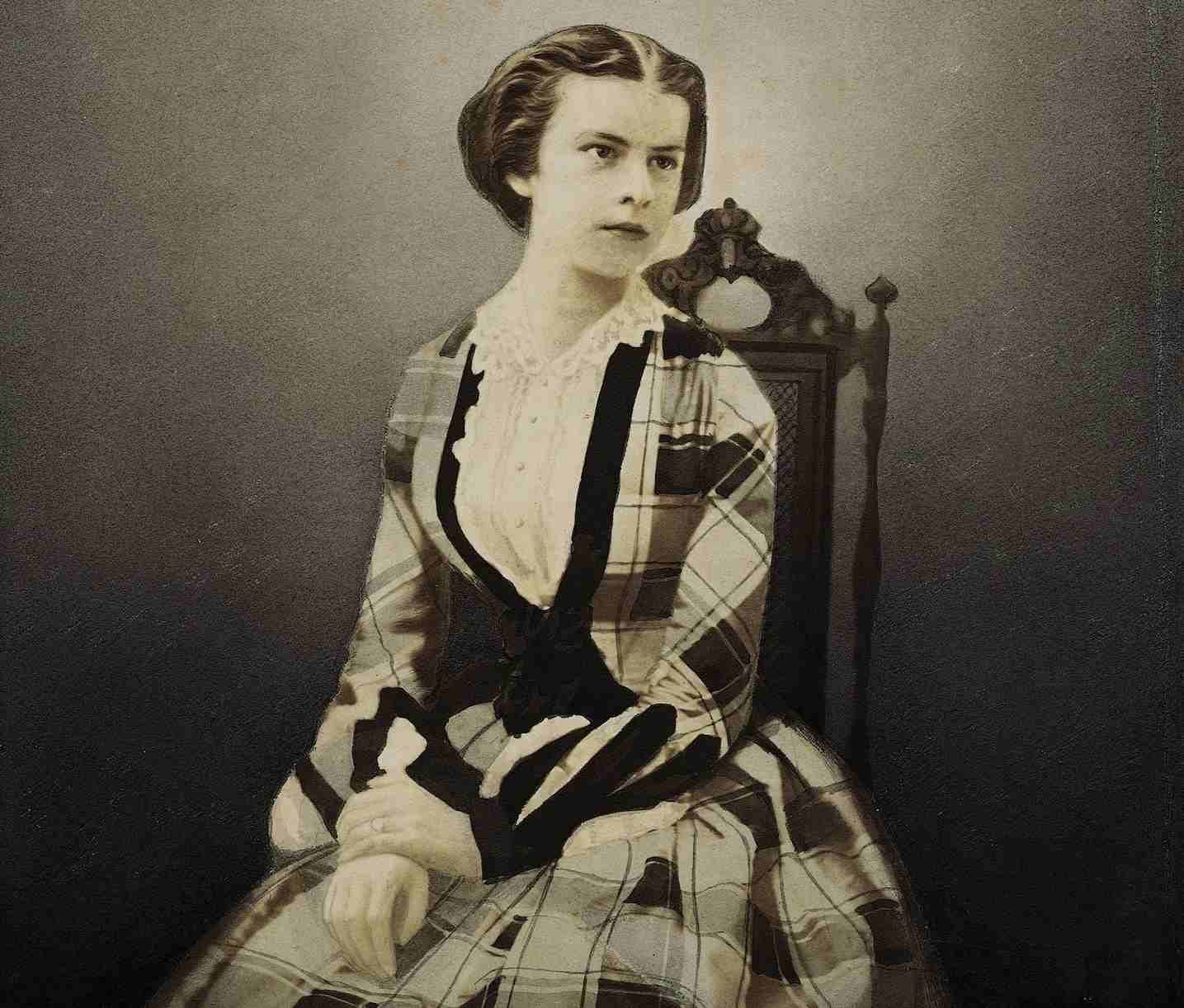
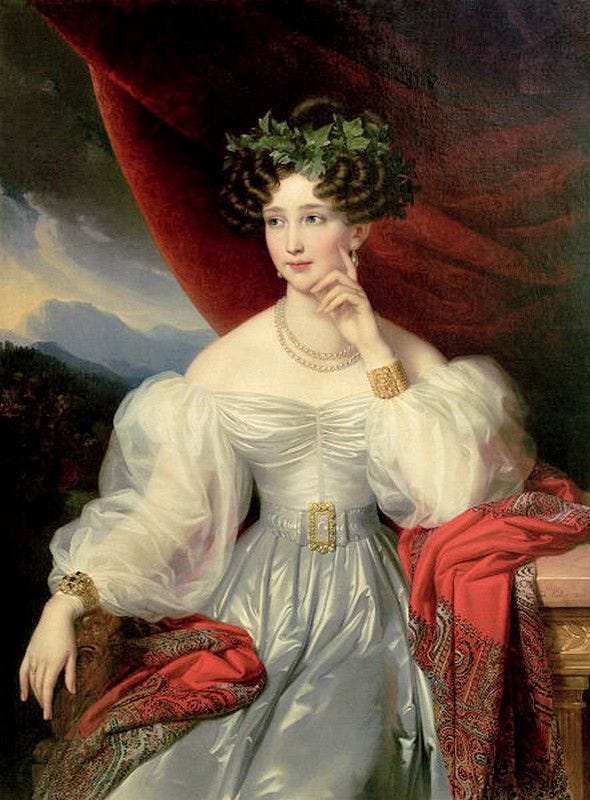

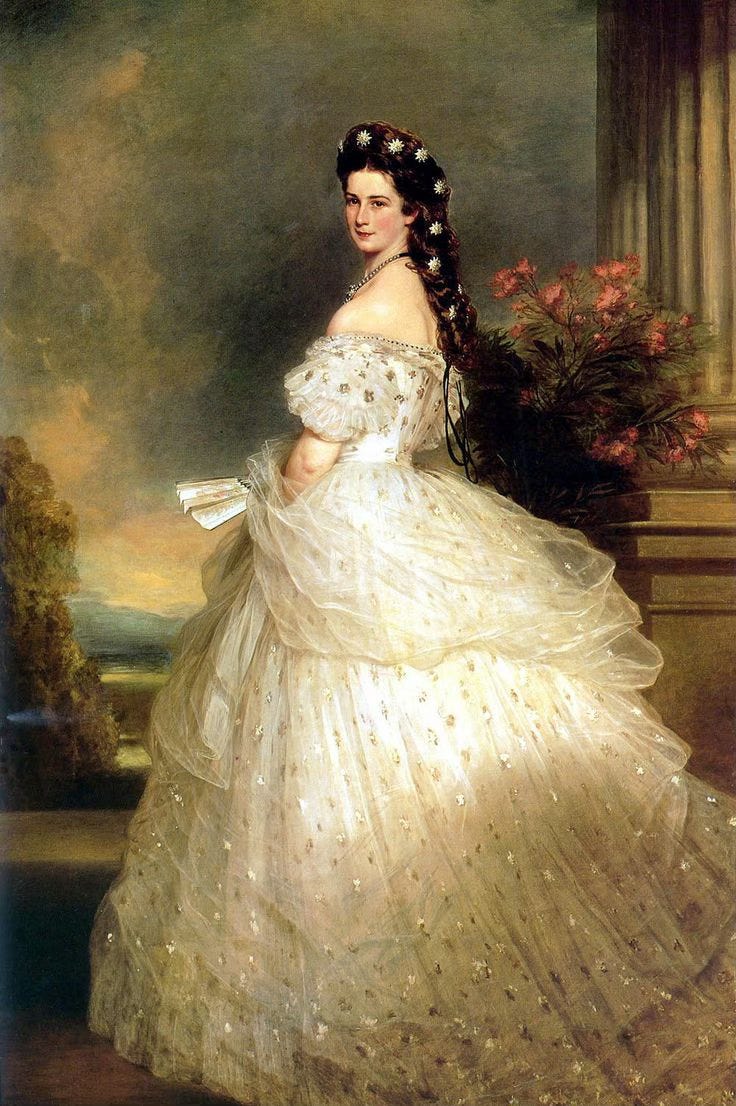
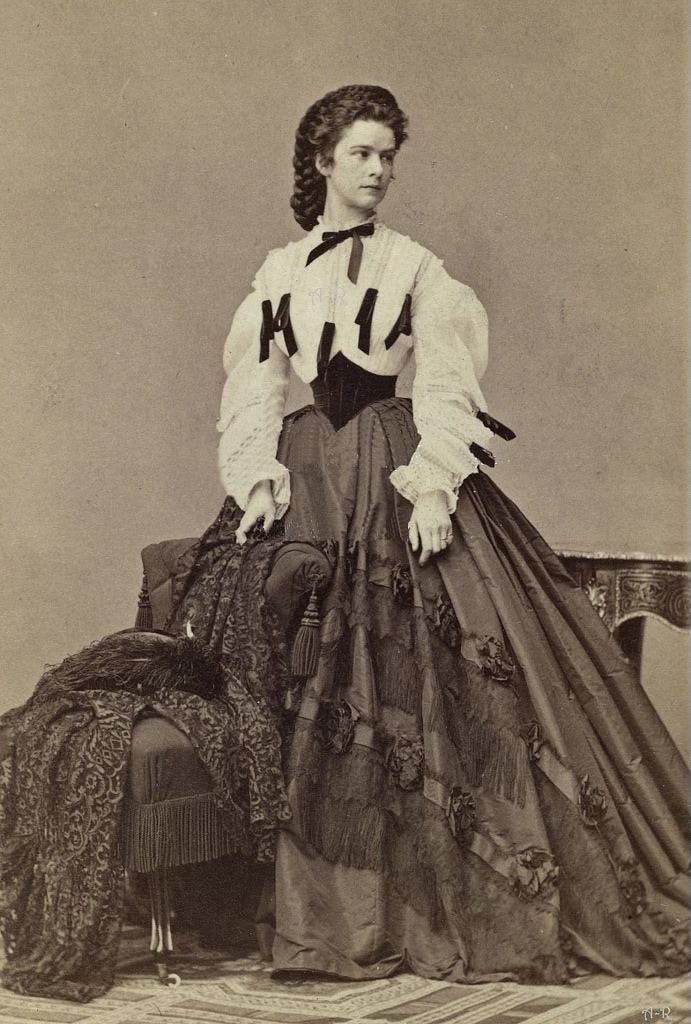
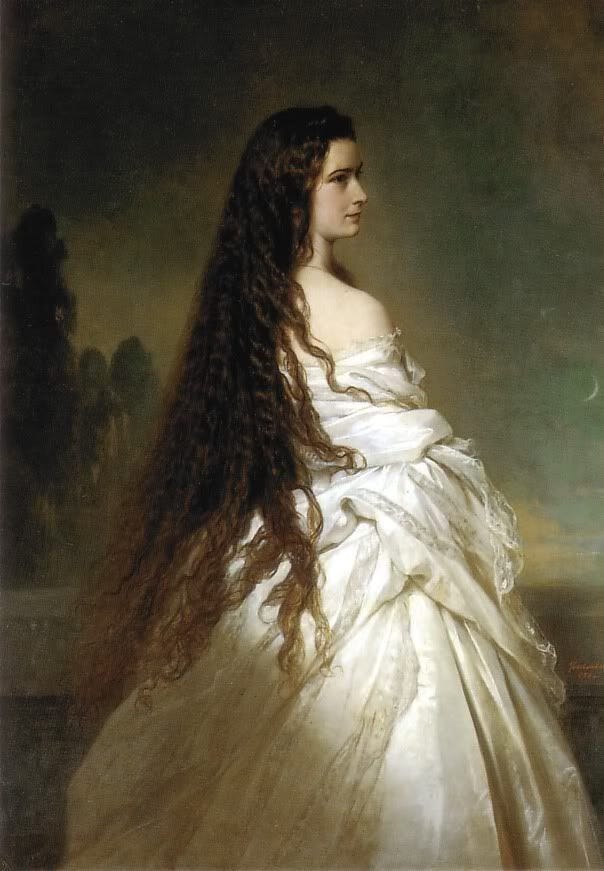


This was… beautiful. I wish there were some sort of tv show based around her life that didn’t try to create a narrative around her or anything of the sort but just… showed her life as it was. I feel like there is potential for some profoundly beautiful cinema that can come from her biopic. That is, if the writers and directors actually pay attention to that person’s real life instead of “being inspired by it”
I studied Empress Sisi whilst at the University of Vienna,, many Austrians were shocked I was unfamiliar with her because she was so widely admired. The Sisi Museum is dedicated to her that was very popular. Her life was so tragic, but she’s seen as “the people’s Queen” similarly to Princess Diana. And she’s a symbol of resistance, not only in Austria but in surrounding countries, particularly Hungary.